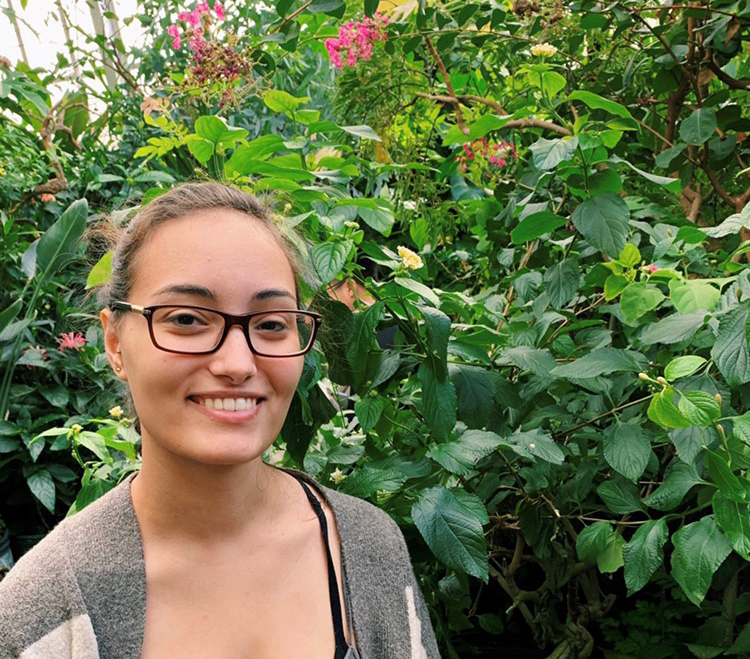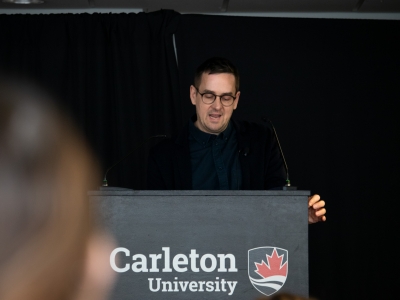Undergraduate students in the Faculty of Public Affairs have the opportunity to pursue a summer research project of their choice under the guidance of a Carleton faculty member through the Carleton University Research Opportunity Program (CUROP). Successful applicants receive a $7,500 stipend.
It’s a competitive program. Only ten of the many students who applied last year were granted internships. Along with learning about their research subject, the program allows students to develop skills in proposal writing, information analysis, project management and networking.

Maeghan Macpherson at Carleton’s Annual Butterfly Show in 2019
After graduating in Spring 2020, Maeghan Macpherson spent the summer conducting research through CUROP with Stacy Douglas, a professor in the Department of Law and Legal Studies. Macpherson graduated with High Distinction from FPA’s Bachelor of Public Affairs and Policy Management, concentrating in Rights and Human Development. She was also a recipient of a Senate Medal for Outstanding Academic Achievement and was on the Dean’s Honour List for all four years at Carleton.
“CUROP helped me consolidate all the skills I had learned throughout my degree,” says Macpherson. “I was able to push past the literature review to learn how to conduct interviews and manage my time in a self-directed project. I was also able to apply the theoretical frameworks I had learned in my fourth year, like qualitative research skills, and put everything together into a final project.”
Macpherson’s project, “Everyday Barriers to Social and Legal Support in Ottawa: A Needs Assessment and Gaps Analysis,” looked at the ways low-income and racialized persons in central Ottawa face systemic barriers when navigating social and legal systems. She investigated the discrepancy between having political and legal rights in theory and actually being able to realize those rights in practice.
“It was nerve-wracking at first to cold-email people I’d never met,” says Macpherson, “but everyone who emailed me back was so generous with their time, so gracious and interested in the project. They were also excited to get the final report. It was wonderful to have support from the community in that way. They really cared about what I was researching.”
Foundation for Social Justice
Through her research, Macpherson found three common obstacles to accessing social and legal supports: language barriers, cultural competence and practical administrative support. By connecting with Ottawa’s Volunteer Facilitator Program, clients can receive help following through with social and legal processes. Trained volunteers can accompany them to service appointments, assist with filling out forms, navigate the system and provide other practical support.
At the end of the summer, Macpherson sent a policy report to organizations with easily implementable recommendations to mitigate barriers to services. She found there is a need for a soft-law clinic, since current resources are stretched.
Now, Macpherson is enroled in the four-year midwifery education program at Ryerson University. She says, “Most people in the program come from health sciences, fewer from humanities. CUROP helped me develop writing and critical-thinking skills. It also expanded my understanding of systemic barriers and the changes that need to be made to overcome them.
“There are so many forces at play — it’s not easy to just change the system. Having appropriate social and legal supports available is the foundation for social justice. Individually, being the best midwife I can be to my clients will make the most immediate and direct impact on their lives and the lives of their families.”
Advice for FPA Undergraduate Students Applying to CUROP
“The first time I applied to CUROP, my application was not accepted,” Macpherson says. “So, the next year, when Professor Douglas reached out about a potential project, I immediately jumped at the opportunity and spent a long time working on the application. This time, I spent a full week writing the research proposal, editing it with my supervisor, making sure it was clear and concise and that I had great references.
She adds, “Students applying to the program should know exactly what they want to research. Their proposal should present a well-defined and focused objective, as well as a plan for implementation.”
Professor Douglas says, “CUROP is an excellent program for keen students to try their hand at primary research. It is the best way to put your academic training to use and to see what intellectual work can do in the world. I am so proud of Maeghan and her project; it shows how academic research can contribute to community efforts to make lives better.”
On October 6, the Summer 2020 CUROP students presented their research at the Undergraduate Research Internship Showcase (online this year). The Showcase is part of FPA Research Series, which celebrates the diversity of research produced in the Faculty of Public Affairs.
The deadline to apply for next summer’s CUROP internship is February 28, 2021.
Read more about student summer research projects from previous years:
2018: The Unexpected Benefits of Beekeeping
Sam Davidson
“An Explorative Study of Apiculture in Social Work,”
2019: Open Doors and Open Minds: Undergraduate Research in the Faculty of Public Affairs
FPA Undergraduate Research Internship Showcase, October 16, 2019
Other Summer 2020 Undergraduate Research Projects
Dami Fakolujo. Bachelor of Global and International Studies, Global Law and Social Justice. “Let My People Go: Biafra and Modern Secession.”
Charlie Hutchinson. Bachelor of Economics, Economic Theory. Minor in Political Science. “Tax Rebates in Ontario.”
Hijaab Yahya. Bachelor of Law, Transnational Law and Human Rights. “Private Lives and Unspoken Truths: How Does the Right to Privacy Contribute to Violence Against Women in Pakistan?”
Alexandra Wilson. Bachelor of Global and International Studies, Global Development. “Chinese Aid versus ODA: The Impact of Agency on the Effectiveness of Aid Programs.”
Rezda Rezal. Bachelor of Law, Business Law. “Reforming Privacy Regulations: A Comparative Study of Canada and Indonesia.”
Shruti Sandhu. Bachelor of Public Affairs and Policy Management. “Non-Partisanship and the Independent Senators Group: A Case Study of Bill C-45.”
Chloé Simms. Bachelor of Communications and Media Studies. “Two Sides of Bipolar Disorder.”
Maddie Stewart. Bachelor of Political Science and History. “Anthropocentrism in Political Thought and Canadian Policy.”
Tuesday, December 15, 2020 in News, Public Affairs and Policy Management
Share: Twitter, Facebook



